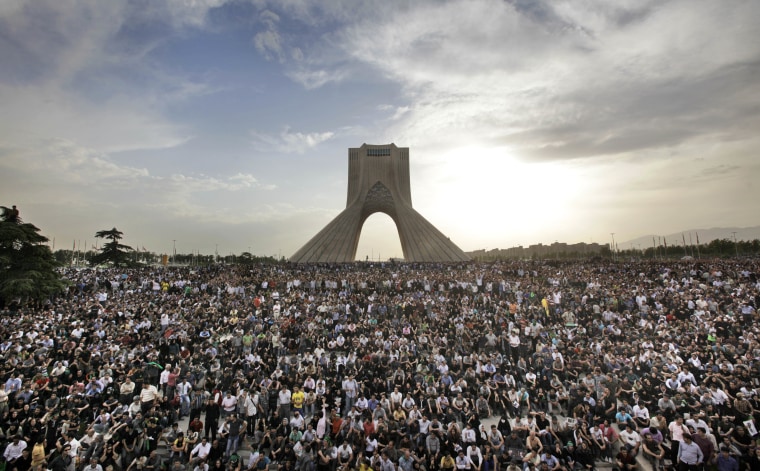The year before Barack Obama's presidential re-election campaign, Donald Trump turned to Twitter with a prediction: "In order to get elected," the Republican television personality wrote, Obama "will start a war with Iran."
We now know, of course, that the Democratic president won a second term without an armed confrontation with Iran. In fact, the opposite proved true: Obama helped secure a historic international nuclear agreement with Iran, marking one of the most impressive diplomatic achievements in a generation.
Eight years later after Trump's failed prediction, he's now in the White House preparing for his own re-election bid. I thought of the Republican's 2011 tweet while reading this report from the New York Times overnight:
At a meeting of President Trump's top national security aides last Thursday, Acting Defense Secretary Patrick Shanahan presented an updated military plan that envisions sending as many as 120,000 troops to the Middle East should Iran attack American forces or accelerate work on nuclear weapons, administration officials said.The revisions were ordered by hard-liners led by John R. Bolton, Mr. Trump's national security adviser. They do not call for a land invasion of Iran, which would require vastly more troops, officials said.
Colin Kahl, an Obama administration veteran, wrote in response, "I oversaw Iran policy and planning at the Pentagon from 2009-2011, at the height of concerns over Iran's nuclear progress, and no plausible contingency except invasion and regime change would require sending 120,000 US forces to the Middle East."
All of this comes against a backdrop in which a reporter asked Donald Trump yesterday about the prospect of war with Iran. The president could've hedged -- or better yet, lowered the temperature -- but he seemed more eager to thump his chest a bit. "We'll see what happens with Iran. If they do anything, it would be a very bad mistake," the Republican said. "If they do anything. I'm hearing little stories about Iran. If they do anything, they will suffer greatly. We'll see what happens with Iran."
Around the same time, Secretary of State Mike Pompeo showed up at a meeting of European foreign ministers in Brussels -- an event to which Pompeo was not invited -- where he reportedly pushed an anti-Iran line.
A Washington Post report added that Trump's chief diplomat "failed to bend attitudes among leaders who fear that the United States and Iran are inching toward war."
In case all of this weren't quite enough, Yleem Poblete, the assistant secretary of state for arms control, verification and compliance, has resigned following a fairly brief stint in Foggy Bottom. There was no official explanation for why Poblete, a noted hawk on U.S. policy toward Iran, stepped down. That said, Reuters recently reported on intra-administration concerns over politicizing and slanting a security assessment about Iran.
If all of this makes you feel like it's George W. Bush's first term, in the run-up to the war in Iraq, you're not the only one who's noticed the parallels.
For his part, the president told reporters a few days ago, "What I'd like to see with Iran, I'd like to see them call me." What, exactly, the American president would like to tell Tehran is not at all clear.
